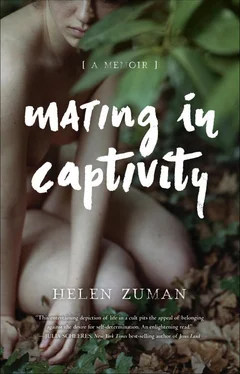He smiled. “Thanks. That would be great.”
In the dining hall, I chose a seat across from his. Picking the flesh from my chicken leg, I listened to Eile quiz Dylan on how he’d found Zendik.
“I used to post to your online bulletin board. Poems and stuff.”
I looked up. “You’re Elfdancer. From the Forum.”
Arol had started the Zendik Forum—with boards for Art, Philosophy, and General Questions—in late 2001, expecting a surge of earnest requests for advice from those hoping to Zendicize their Deathculture lives. Such petitions did trickle in—along with a stream of criticism, which Arol denounced as nasty gossip. After about a year, she shut the Forum down.
Elfdancer had posted most often to the Art Forum, which I’d helped mind. I remembered his wistful paeans to wild mountain quiet, his impressionistic vision of a diffuse utopia blooming in coffee shops across the nation, his allusions to through-hiking the Appalachian Trail.
“Yeah,” he said, “I’m Elfdancer. From the Forum.” His chin rose in challenge. “Why’d you guys ax it?”
“We got sick of the attacks. Sure, we’re not perfect. But we are starting a new culture. Why waste time on a bunch of losers badmouthing us so they can stay on the couch?”
He shrugged. “ I thought the back-and-forth was kind of healthy. But I knew all along that the only way to really get what was going on here was to see for myself.”
I nodded, wondering if I’d psychically drawn him to visit—if the romantic moonscape I’d been facing had finally given rise to a tiny green shoot.
At the time of Dylan’s arrival, almost every man on the Farm either had a girlfriend or had recently refused my hit-up. Even Kro remained cold. Plus, I’d noticed something strange: though Arol had warned us more than once that sleeping together exposed couples to ill-defined dangers, more and more of my Potato Shed roommates were joining their lovers in other houses for regular sleepovers. Some were even prolonging dates till morning and slumbering—with the luxury of a double bed—in the date space.
Arol slept with Prophet, Swan slept with Noi, every night in double beds in the Treehouse (a cozy log cabin, adjoining the Addition, custom-built for Arol and her intimates). It went without saying that sleeping together was safe for them.
The loft I shared with Eile, under a pitched roof, peaked at about four feet. But it was deep enough to allow each of us a double mattress. The emptier the Potato Shed got, the more I longed for a man to share my bed. If I didn’t join the sexual slumber party soon, I thought, I’d miss my chance. I knew it couldn’t last.
I had little to lose but my loneliness. Why not hit Dylan up for a walk?
A couple nights after his first supper, I caught Karma in the main kitchen and ran my plan by her. Then I marched down the hill to find Dylan. (About a year earlier, Arol had cut out the middle woman, leaving us to proposition each other in person.) En route to the Old Music Room—now the visitors’ house—I spotted him on the Farmhouse porch. Heart pounding, I waved and translated my offer into his vernacular: “Hey, I was wondering if you’d wanna hang out with me.”
“You mean, do I wanna go on a ‘walk’?” he shot back.
“Right.”
He smirked, eyes spiked with mischief. “Yeah, I know the lingo.”
At the end of the driveway, we turned down Regan Jackson, the faint whoosh of traffic a half mile away on Lake Adger our only cue that we shared the night with other humans. Ever curious about the paths people took to Zendik, I urged him to recount his recent adventures. It turned out he’d through-hiked the Appalachian Trail in 2001 and traveled to Fort Benning, Georgia in late 2002 to join a yearly protest against the US Army’s School of the Americas.
I knew of the SOA’s reputation for training Latin American troops to crush dissent with violence. I’d once applauded those who risked arrest by “crossing the line” onto SOA property every November. I’d even given the Farm my grant money in part to sidestep a federal Midas whose touch turned gold to war. But my Zendik story fenced out respect for others’ answers. So I felt only pity, tinged with irritation, when Dylan told me he’d start a three-month prison term in April.
“I could have gotten out of it,” he said, “but I had to stand by what I did. Take the consequences. And I feel like I’ll learn something from being in prison. I don’t know what, but something.”
“Uh-huh,” I said. Dead end.
“So, do you have a girlfriend?”
We’d passed the neighbor’s tidy ranch house. Two horses—one at the fence, one at a distance—nibbled on grass. Dylan ducked his head and mumbled.
“What did you say?”
“I said I’m not sure.”
“What do you mean?”
“There’s this girl… We’re taking a break… It might be over…” He shook his head. “I don’t know.”
At the edge of the neighbor’s pasture stood a pale blue school bus that disappeared farther into the woods each year. It always made me think of Chris McCandless, the man who’d vanished Into the Wild . He’d starved to death in an abandoned bus much like this one, unaware of the nearby cable car that could have whisked him over a swollen river to the help of other humans. He would have known the route to reunion—if he’d brought a map.
Just past the school bus, Regan Jackson gave way to an overgrown logging path twisting through spindly new growth. “Let’s go back,” I said. “I don’t like being in the woods at night.”
Eyes trained on the road’s next bend, I calculated. Dylan would go to jail. That meant he wouldn’t stay. Sure, he might return once he’d completed his sentence—but I didn’t see it. Should I risk liking a man unbound to Zendik?
Would I slow my sexual evolution if I didn’t risk it?
My sexual evolution—I lingered on Dylan’s bond to “this girl” just long enough to dismiss it. How could lovers join in the Deathculture, split by walls of lies?
As the road curved toward the Farm, I roused my nerve and took my risk.
“Do you wanna kiss?”
“No,” he said, gazing straight ahead.
I understood this no; I just didn’t believe it. A couple years earlier, I’d been first to go on a walk with a shy newcomer a few years my junior. We’d hiked up to a bald hilltop with a sweeping view of the surrounding mountains. Other Zendiks called it the Landing Pad; I called it the Moon Landing. By moonlight that night, I asked if he wanted to kiss. He said no. I kissed him anyway. He kissed me back and told me later that he’d said no only out of fear that he wouldn’t know what to do. At nineteen, he’d not yet kissed a girl.
Though I assumed Dylan had kissed other girls, I took his no to be negotiable also. As we ascended the driveway, as we neared the Farmhouse, as my chance began to vanish, I took another risk. I stopped, grabbed him by the shoulders, and kissed him on the mouth. He was twenty-one; I was twenty-six.
Later, by letter, he would say, You shouldn’t have done that. You betrayed my trust. Had the shy nineteen-year-old felt the same?
Stopped in the driveway, Dylan returned my kiss, pressing against me with his lips, chest, hips. I clasped his hands and stepped back.
“Let’s go to a date space. The one behind the Addition.”
In the date space, we made out but didn’t disrobe, so as not to cross the line from walk to date. Zendiks weren’t supposed to go on dates with visitors still on quarantine.
By the next morning, the rest of the Farm knew I’d necked with Dylan. Two nights later, we had our first date. The morning after that, he came off quarantine—six days early. He knew how to cook, we needed cooks, and everyone agreed that if he had any bugs they’d already entered the communal stew through me.
Читать дальше











